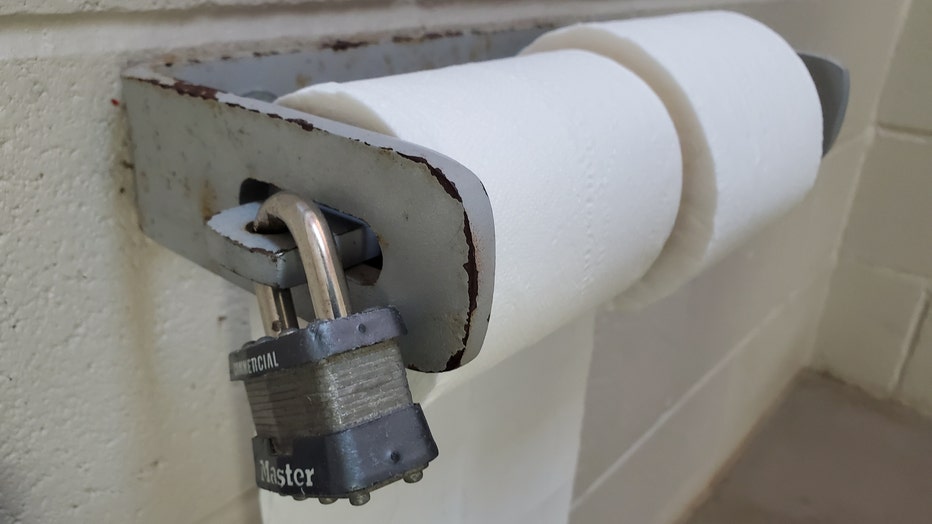Shortages easing on coronavirus-hit toilet paper
LOS ANGELES - U.S. consumers have begun spotting rare Quilted Northern and Charmin toilet paper rolls on store shelves across the United States, as stocks start building after weeks of severe shortages.
Shoppers who bagged the coveted rolls are crowing on Twitter about their finds. “Found some toilet paper in the wild! Driving it home now,” tweeted @TransForYang on April 23. “This is as close as I’ll ever come to knowing what it feels like driving one of those armored money truck4s.”
RELATED: No gym? Try this woman’s toilet paper workout routine
Empty shelves were still a problem at nearly half of American grocery stores as of mid-April, but supplies were markedly more plentiful than they had been during the prior week, according to the consumer products data tracker NCSolutions.

FILE - A padlock is visible locking a roll of toilet paper on a dispenser in a commercial facility in Livermore, California, April 22, 2020. (Photo by Smith Collection/Gado/Getty Images)
About 48 percent of U.S. grocery stores were out of stock of toilet paper for some part of the day on April 19, the latest date for which figures were available. In comparison, out-of-stock shelves were prevalent at 73 percent of U.S. grocery stores one week earlier, on April 12, according to the data, provided exclusively to Reuters.
Demand for toilet paper is still up 27 percent from pre-Covid-19 levels, NCSolutions said.
The average U.S. household - 2.6 people - uses about 409 rolls a year, according to Georgia Pacific, maker of Angel Soft and Quilted Northern. It estimated that staying at home 24/7 would boost that by 40 percent, and that a two-person household would use nine double rolls in about two weeks.
RELATED: ‘How to make toilet paper’ search spiked 1,300 percent on Google amid COVID-19 pandemic
Toilet paper is not the only essential item shoppers stocked up on after states started locking down businesses to curb the spread of the novel coronavirus in mid-March. The large size of toilet paper packages versus other staples such as pasta, soap and canned goods means that retail stores rarely keep much in stock, and so are quicker to run out.
In Europe, the shortages at retail stores may be less dire due partly to the fact that some production is done closer to retailers.
“Normally there are fewer and larger factories in the U.S.,” said Magnus Groth, chief executive of Europe’s biggest toilet paper maker, Essity. Groth said Essity, which in the United States sells tissue products to businesses only, met a spike in European demand by boosting production, selling down inventory and securing extra transport capacity.
The U.S. retail market for toilet paper was worth $9.7 billion last year, according to Euromonitor International.
RELATED: CoronavirusNOW.com, FOX launches national hub for COVID-19 news and updates
Procter & Gamble dominates with about a 29% share, followed by Kimberly-Clark, maker of Cottonelle and Scott, and privately held Koch Industries-owned Georgia Pacific.
For Charmin maker Procter & Gamble, March and April will be record production months, said Rick McLeod, its vice president of global family care product supply.
The company’s six U.S. plants are running 24/7, focusing on the most popular products. P&G’s plants manufacture massive “parent” rolls of toilet paper and then convert them to small rolls for home use. The parent rolls, which are a standard in the industry, measure more than eight feet in diameter and weigh about a ton.
“Our data says that in-stock levels are improving but not where we want them to be certainly,” McLeod said.
Georgia Pacific is now making 1.5 million more roles per day, and is trying to maximize the number of deliveries it can ship. Its mills and regional distribution centers have shipped about 120 percent of normal capacity, while a shift to direct shipments where possible has reduced shipping time to retailers by up to three days, a spokesman said.
Store checks last week showed toilet paper was approaching normal stock levels after being “deeply deficient for over 50days,” said Burt Flickinger, managing director of consulting firm Strategic Resource Group, adding that it was the first week his firm saw adequate levels of shelf stock.


